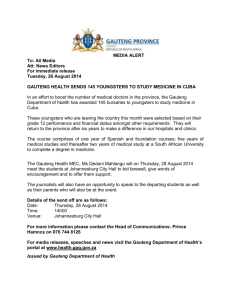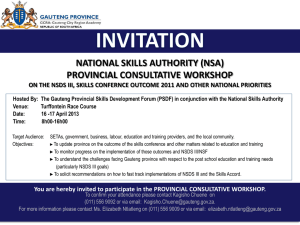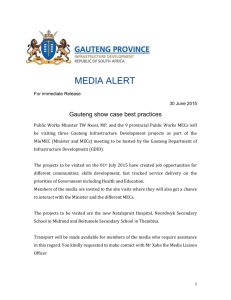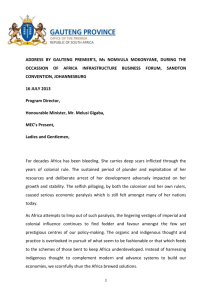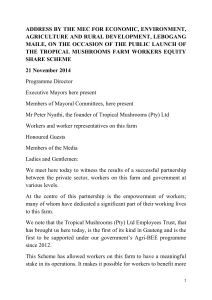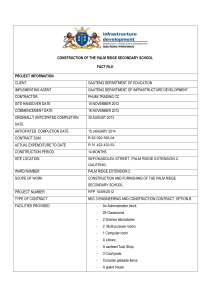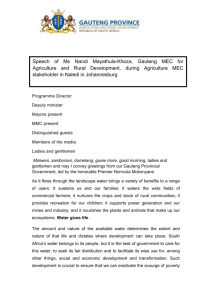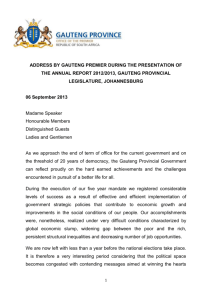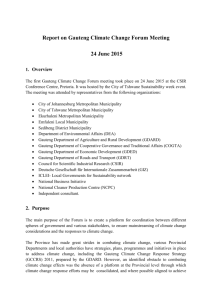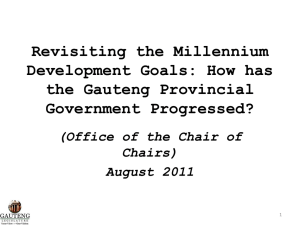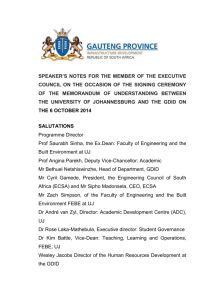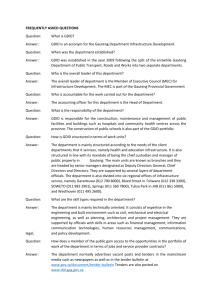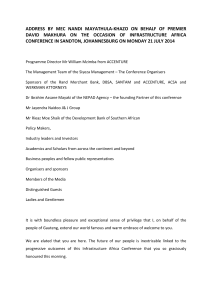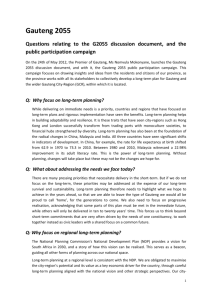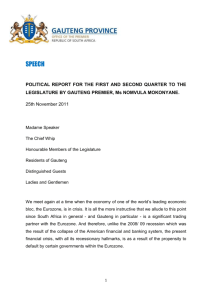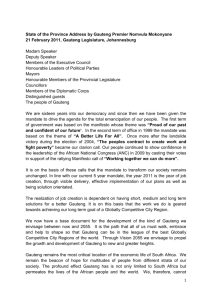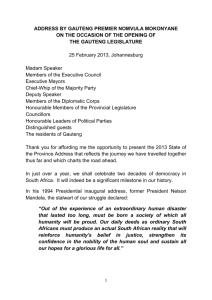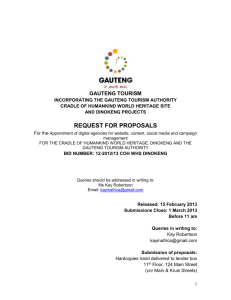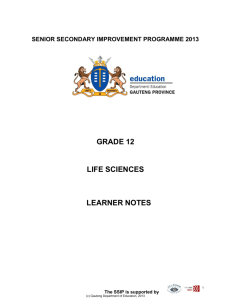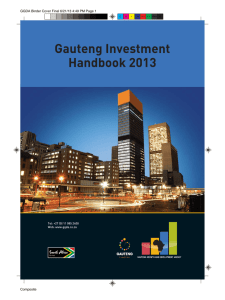Introductory speech on the debate on the 2013-14 HS
advertisement
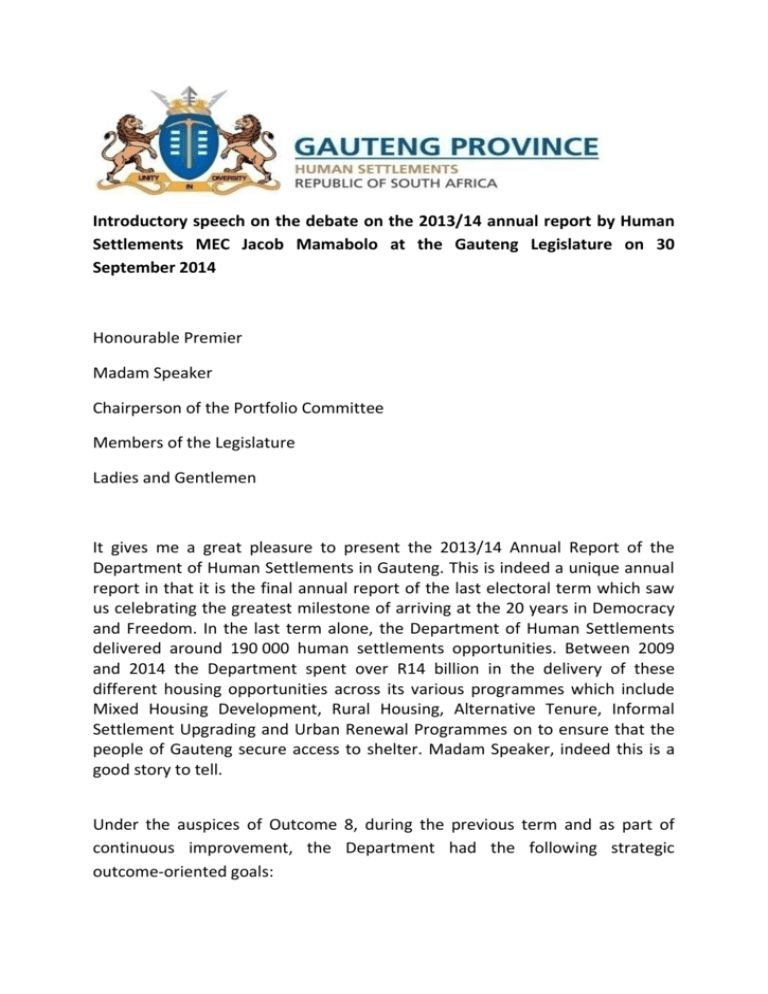
Introductory speech on the debate on the 2013/14 annual report by Human Settlements MEC Jacob Mamabolo at the Gauteng Legislature on 30 September 2014 Honourable Premier Madam Speaker Chairperson of the Portfolio Committee Members of the Legislature Ladies and Gentlemen It gives me a great pleasure to present the 2013/14 Annual Report of the Department of Human Settlements in Gauteng. This is indeed a unique annual report in that it is the final annual report of the last electoral term which saw us celebrating the greatest milestone of arriving at the 20 years in Democracy and Freedom. In the last term alone, the Department of Human Settlements delivered around 190 000 human settlements opportunities. Between 2009 and 2014 the Department spent over R14 billion in the delivery of these different housing opportunities across its various programmes which include Mixed Housing Development, Rural Housing, Alternative Tenure, Informal Settlement Upgrading and Urban Renewal Programmes on to ensure that the people of Gauteng secure access to shelter. Madam Speaker, indeed this is a good story to tell. Under the auspices of Outcome 8, during the previous term and as part of continuous improvement, the Department had the following strategic outcome-oriented goals: Address housing needs, through effective research, planning and the development of appropriate human settlements policies. Build cohesive and sustainable communities by ensuring that innovative services and infrastructure are provided to create sustainable human settlements. Build an inclusive economic environment which is conducive to the creation of decent work. Efficient management management. of provincial assets through property These were all attempts at ensuring increased access to housing for the everincreasing population of Gauteng. Unlike anywhere in the country, Gauteng continues to attract hundreds of thousands of new people. Gauteng is an urbanised province with almost 97% of its people living in the urban areas. Census 2011 has confirmed that Gauteng is home to the majority of South Africans, being home to more than 12 million people. The millions of migrants from neighbouring countries come to settle in Gauteng in pursuit of economic and employment opportunities. This impacts negatively on infrastructure and service delivery. These patterns are expected to continue as Gauteng remains a destiny of choice for many job seekers. Madam Speaker, the house will also note that it is in the last term that the concept of housing accreditation to the municipalities was introduced. Such rapid urbanisation and in-migration places an enormous pressure on the limited resources that we have as a state. Thus proper planning becomes key in maximising value off the limited resources we have at our disposal. As a result, in the period under review the Department, under the stewardship of the now Speaker of Legislature and former MEC Ntombi Mekgwe, undertook various efforts to effectively respond to the growing housing needs in Gauteng. Key amongst these includes the following; Advanced work done on Densification Policy, Land Invasion Framework. Process is underway to develop Gauteng Rental Housing Strategy. Drafted Densification Policy and Land Invasion engagements internally and with municipalities. Framework - Stakeholder engagements on the findings of the review of Backyard Rental were successfully undertaken as planned, and significant progress was made. A Backyard Summit was identified as a way forward which will be undertaken in the 2014/15 financial year. The Community Residential Units (CRU) Research study was finalised; the Gauteng Policy Research and Strategy Forum was launched. Service Delivery Improvement Plan Madam Speaker one of the critical challenges we had to pay attention to is the illegal invasion of land and illegal occupation of RDP houses in the province. With the critical shortages of land in Gauteng, any land invasion compounds and adds to the problem we already have on access to land. On the other side of the coin, when evictions are effected to remove the invaders, all too often it is harsh and as government we are forced to provide alternative accommodation, something always not budgeted for. So the Land Invasion framework is a key strategic intervention dealing with this problem. As a post merger reconfiguration of the Department, the Sedibeng/West Rand Region was divided into two distinct regions, namely Sedibeng region and West Rand region thereby linking each to the two municipal districts in the province. This was done to ensure improved efficiency and ease of planning which should result in better and improved housing delivery. Madam Speaker, in the year under review the Department also continued to keep a closer look at GEYODI empowerment. The Human Settlements Incubator programme was resuscitated and 30 construction companies were invited to participate in this empowerment programme. The targeted groups are as follows; 10 women, 10 youths, and 10 PWDs (People with disabilities). Our work across various projects throughout the province created A total of 13 189 jobs, which benefited 1 716 adult females, 1 456 youth females, 76 PWDs, 5 764 adult males and 4 177 youth. Whilst we secured a total of 31 313 housing opportunities in the 2013/14 financial year, the Department received a qualified report. This is of concern to us and we are taking all the recommendations of the Auditor-General to heart, and we shall ensure that all matters raised in the report are remedied. As an urgent intervention, we are in the process of appointing a Chief Financial Officer to take the financial reigns and assist in improving the financial management system in the Department. Madam Speaker, as the new administration we will work faster and harder to build on the legacy that started in 1994, as led by the African National Congress. As we march gallantly towards a radically transformed society, we will make sure that we put our people at the centre of housing delivery. We know that housing is a very basic need and something very emotional hence the service delivery protests. Our assurance to the people of Gauteng is that we continue in our endeavours to ensure that we procure prime land and optimize how we utilize available the land for housing densification. I thank you all.
